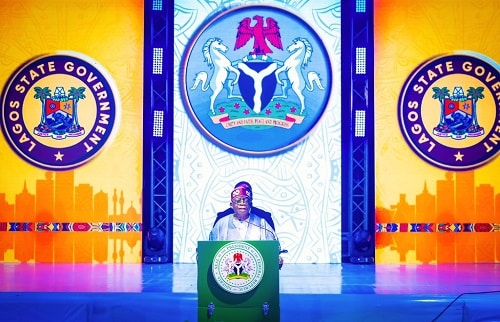Editorial
Subsidy Removal: Tinubu’s N500 Billion And The Actual Palliative Nigerians Need

At the risk of sounding like an insatiable bunch, Nigerians have stridently criticized President Tinubu’s rollout of N500bn palliative intervention to cushion the effect of the removal of fuel subsidy on vulnerable Nigerians. There had been loud disenchantment over Tinubu’s public foreclosure of fuel subsidy payment without first putting measures in place to ameliorate the concomitant galloping inflation and skyrocketing prices of goods and services. Now, citizens are further incensed by the fact that in one breath the President intends to spend N500bn on 12 million poor households while in another budgeted N70bn for members of the 10th National Assembly. As it were while these households will be getting ₦8,000, each federal lawmaker will be cornering between N140 million and N150 million.
The President had in a letter addressed to the Speaker of the House of Representatives Abbas Tajudeen, read at plenary on Wednesday sought an amendment to the N819.5 billion 2022 supplementary budget, extracting N500 billion to provide palliatives to cushion the effect of subsidy removal, as well as N70 billion to the National Assembly to support the working conditions of new members. Hours after the House of Reps granted this request, the Senate also stamped its approval. This was happening about the same time Tinubu told the Class of 1999 Governors, who paid him a visit as one of their own that, “The palliative is coming. I am doing the arithmetic. I don’t want the cash transfer to fall into the wrong hands. I know it pinches and it is difficult. In the end, we will rejoice in the prosperity of our country”.
But Nigerians seem not to be impressed. After heckling President Tinubu for putting the cart before the horse in the manner of removing fuel subsidy without first putting palliative measures in place, Nigerians have voiced their disenchantment with this intervention that will see vulnerable Nigerian families receiving N8000 from the federal government within a period of six months. The reasons for the grumbling range from the amount paling into insignificance vis-a-vis what the government has taken from the people to the trust deficit in the authorities to allow the pittance to get to those who really need it. The cynicism and pessimism trailing this initiative is understandable. If whatever is worth doing is worth doing well, then there must be adequate compensation for policies that impoverished the people.
The announced palliative measure may not be entirely misplaced when placed side by side Nigeria Development Update released last by the World Bank which stated that poor and economically-insecure households face an equivalent monthly income loss of ₦5,700 as a result of the inflation occasioned by the removal of fuel subsidy. It would be recalled that the President had in his inaugural address pulled the plug on PMS subsidy payment on the ground that the 2023 budget does not make provision for the expenditure. Fuel stations instantly implemented a 300 per cent hike in the pump prices of premium motor spirit which also soared the prices of goods and services in the country. The World Bank in the Update pointed out that even with the implementation of cash transfers to 10 million most vulnerable Nigerians, the country would still suffer a net increase of 5.4 million extremely poor people as a result of the decision.
As it were, Tinubu’s projection surpasses this figure. The President, who had practiced as a professional accountant, was optimistic about the formula he intends to use in ensuring that the palliatives get to vulnerable Nigerians. This was when he said, “The palliative is coming. I am doing the arithmetic; I don’t want the cash transfer to fall into the wrong hands. I know it pinches and it is difficult”. This supposes that in this reiteration of the conditional cash transfer, it won’t be business as usual nor a rehash of what obtained under the immediate past administration. Therefore, pragmatic steps must be taken by the Tinubu administration to ensure that there is transparency and accountability in the distribution of this palliative. Nigerians will readily get over their misgivings about palliative if the amount is seen to be equitably and judiciously handed out to the poorest of the poor.
Widespread sleaze of the past years and questions around a nebulous social register the cloud of suspicion from the citizens continues to loom large. In the absence of accurate national data, corrupt government officials had been defrauding the system in the name of poverty alleviation. The Buhari government had made a song and dance of disbursing ₦5,000 each to about 24.3 million poor Nigerians over a period of six months as a cushion for those further impoverished by the COVID-19 pandemic. This happened without accountability as Nigerians will be hard-pressed to identify anyone in their rural areas who was a beneficiary. More so, there are reports that the disbursement was directed to a particular section of the country. Hence, little wonder the skepticism.
Naija News regrets that the National Assembly failed to take cognizance of the concerns of Nigerians about the palliatives before hastily approving the President’s request. If the amendment to the supplementary budget request had been robustly debated in both chambers of the National Assembly, Nigerians would have been well informed with the government having no other option than detail how the N500bn will be distributed. More so, doesn’t the lack of specificity and vital details regarding how the proposed N500 billion will be allocated, spent and utilized violate Section 81(2) of the 1999 Constitution as amended? We hope that the 10th Assembly is not already following in the footsteps of its predecessor in terms of being a rubber-stamp legislature.
This newspaper challenges the Akpabio-Abbas-led National Assembly to assert its constitutional power of appropriation and demand that the requested amount’s specifics and the planned utilization be sent to it for vetting before approval. This stance is made more imperative by the fact that the Tinubu government cannot be proposing to use the 2022 budget to alleviate the hardship arising from the fuel subsidy removal that was announced in the middle of 2023. When finally approved, the federal government may consider handing over the N500bn to the third tier of government with each of the local governments mandated to set up a committee comprising credible community leaders, civil society groups, religious leaders and political leaders to ensure that this palliative measure gets to the very people to who it is intended.
Naija News hopes that this disbursement of N500bn is not all there is to the much talked about palliatives. Giving 12 million poor households N8000 for six months tantamounts to a drop in an ocean considering that poverty is working on all fours in the country. There is no better time than now to industrialize the country. We also call on Tinubu to keep in mind his pledge to Nigerians on June 12 that his administration will invest massively in transportation infrastructure, education, power supply, healthcare, and other public utilities to improve the lives of Nigerians to repay Nigerians for the removal of fuel subsidy. Such investment is the actual palliative Nigerians need.












